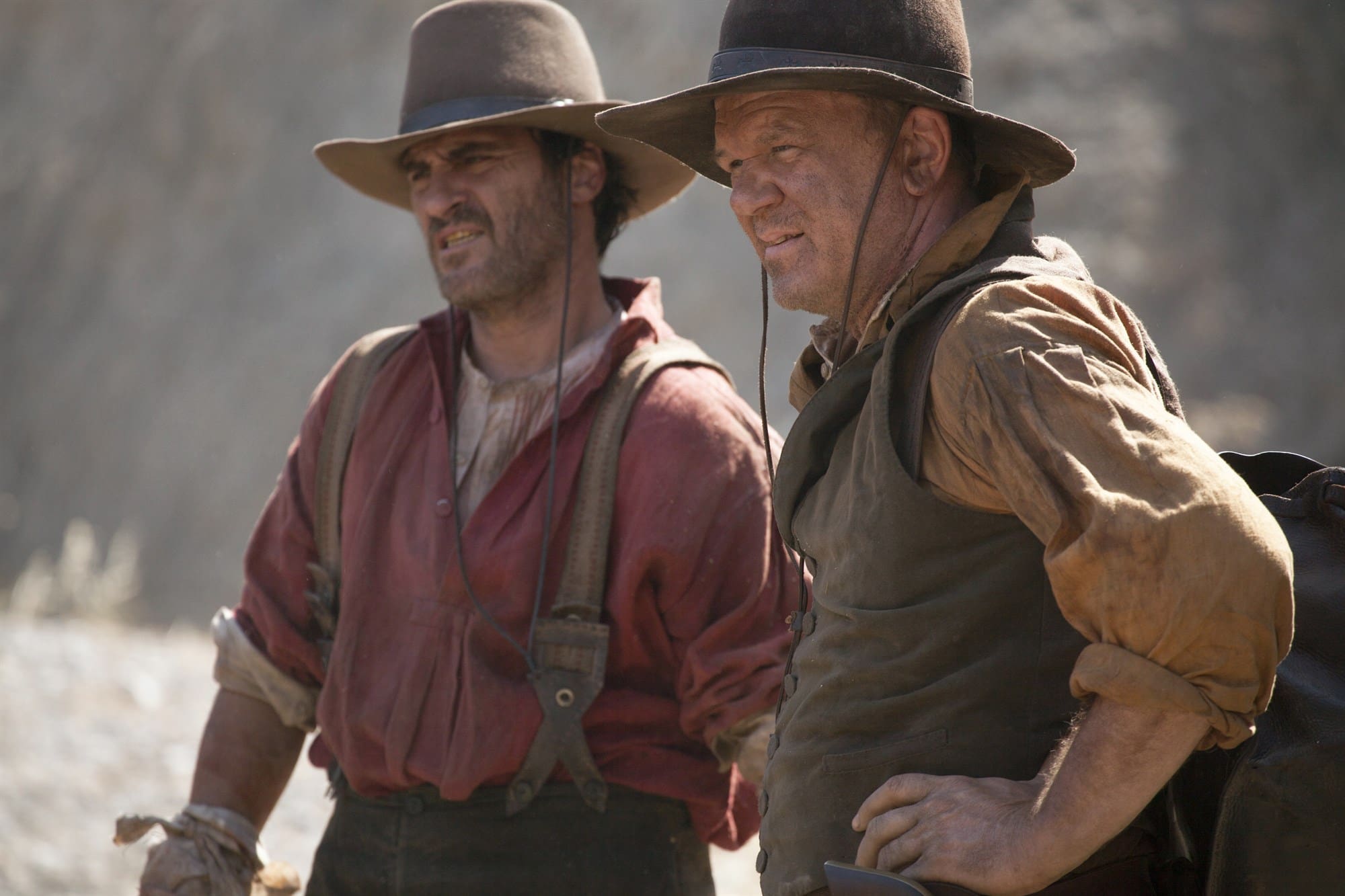
Holding all movies to the same rubric is a silly concept – it goes without saying that each genre carries with it a different set of expectations, and that a director’s intent dictates how we should process what ends up on screen. But is it fair to apply a particularly tough set of expectations to a film, just because of the talent involved? That very question hangs over every frame of The Sisters Brothers and, unfortunately, is the most memorable thing about the film as a whole.
Based on the Patrick Dewitt novel of the same name, the English-language debut of French director Jacques Audiard (the terrific Un Prophete) follows the titular characters, two hitmen in the old West. Tasked with tracking down a prospector (Riz Ahmed) who has developed some new technology to help make the gold-digging process easier, brother Charlie (Joaquin Phoenix) embraces the difficult task, while Eli (John C. Reily) starts to question their violent lifestyle. What follows successfully walks the fine line between comedy and drama, finding a decent balance of both tones, while still supplying some satisfying shoot outs and interesting twists. There are certainly some bizarre narrative choices and odd directorial decisions, but the film works at its most basic level.
But should it work better? Is it fair to ask for more? Joaquin Phoenix is constantly mentioned as one of our finest working actors, while John C. Reily has a positive reputation as a committed character actor who has found success in all different genres. Both actors deliver strong performances, even if these parts are well within their respective wheelhouses. Riz Ahmed, meanwhile, is a promising young actor who gained much acclaim (and an Emmy!) for his work on HBO’s The Night Of. Here, he proves to be an absorbing screen presence, that feels completely separate from his work on the aforementioned limited series, or his breakout part in Nightcrawler. Speaking of, Jake Gyllennhaal even shows up in a memorable supporting turn, making the most of an underwritten character as John Morris, an investigator tasked with tracking Ahmed’s prospector and luring him to the Brothers. Audiard, meanwhile, makes the transition from French cinema to a Hollywood picture quite smoothly – this is, unquestionably, a well made movie.
But why does it also feel so forgettable? As well made as the film is, nothing about it truly stands out. We’ve seen this kind of western before, and while the film is, first and foremost, a character study, it isn’t exactly breaking new ground in terms of character development. It’s absorbing, but not exactly entertaining. On paper, it should be a thrill to see Phoenix and Reily team up, and Ahmed should be able to use this role as a platform to bigger and better leading work in Hollywood. But, really, this film starts to drift out of your memory by the time it ends. And while this is certainly true of many, many movies, the less memorable filmgoing experiences rarely feature so much talent both in front of and behind the camera.
There are little hints as to what might have gone wrong. For one thing, this feels like a movie that had large chunks left on the cutting room floor. Carol Kane and Rutger Hauer both show up in unremarkable parts – in fact, I don’t recall the latter having a single line of dialogue. Additionally, Emmy nominee Allison Tolman (FX’s Fargo) appears as a sex worker in one of the film’s more memorable moments, but her character isn’t even given a name and is forgotten about mere seconds later. While it’s hard to imagine these characters playing a crucial part in the story, since the film’s narrative makes sense and works on its own, it’s distracting to have these actors show up in the first place, and begs the question: what drew them to this part? What is missing here?
Audiard’s direction, while solid, also has some bizarre choices that feel unearned. The film is brutally violent at moments, which don’t gel nicely with the more comedic bits and generally calm tone. A flashback to the Brothers’ childhood, meanwhile, is put through a horror movie lens – Eli remembers his abusive father as an almost demonic-looking figure, and a violent act is distorted in a creepy, Polanski-esque manner. That sort of visual motif would work if employed throughout, but, if used only once, it feels random.
Finally, the relationship between Ahmed and Gyllennhaal’s characters carries a slight hint of romance that is never explicitly mentioned—let alone acted upon—but still feels like a conscious decision by both actors and their director. Why didn’t this get explored further? Again, these questions or hangups don’t do anything to lessen the movie. It’s still perfectly fine and entertaining. But it begs the question: was there a better movie here, somewhere?
Consciously or not, we walk into movies with a certain expectation. In a perfect world, someone would be able to ignore the film’s quality in relation to their expectations, and give it a genuine review. We spend so much time wondering if a movie is good, or just better than our low expectations … bad, or just worse than we thought. But we’re never prepared for when a movie meets the bare minimum of our expectations. With actors and a director like this, there’s no need to expect just a decent movie. The evidence is there to suggest this movie will be great. But, when A-list talent delivers a movie that is just fine, it certainly leaves your brain rattling.
Overall rating: 6/10

